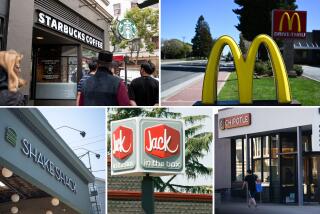Buying a Franchise Often Has Pitfalls : You Can Become a Prisoner When You Join the Chain Gang, Book Says
- Share via
NEW YORK — The franchise has become the great American dream for people eager to be their own bosses but without any particular idea of what they want to sell.
But buying a franchise from a restaurant, car repair or other national chain is not always a ticket to financial success or even career independence, said Stan Luxenberg, author ofthe recently published “Roadside Empires--How the Chains Franchised America.”
Some Became Rich
“Most new businesses fail, and most chains’ franchises fail,” he said.
About half a million Americans own franchises, and some have indeed become rich in the process.
“The average McDonald’s franchise makes $100,000 a year, and it’s not unusual to have two or three,” Luxenberg said. “Midas Mufflers also have an excellent chance of success. But there are thousands of chains, and most aren’t McDonald’s or Midas Mufflers.”
Although the franchise business has been shaken in the past by cases of fraud and misrepresentation, Luxenberg said he does not believe scams are the real problem for a new investor.
“The concern is that you’ll buy a license from the chain, and the chain won’t be that good. Or (it will be) just unlucky.” One has only to look at certain shopping center locations, he said. “There’s a constant turnover at some stores--a chicken place gives way to a pizza place gives way to a taco place.”
While a prime chain may charge much more, the typical franchise license costs $10,000 to $50,000, Luxenberg said. The franchisee then must pay to lease space for a store and hire a staff.
When profits start coming in, 2% to 6% of gross sales typically must go back to the franchiser. “McDonald’s charge is 11%, but that includes the real estate,” said Luxenberg. Unlike most chains, McDonald’s generally owns the stores themselves and leases them to the franchisees.
Support Varies
The degree of support a franchisee gets for his money varies widely. Many chains will help the new businessman set up his outlet. In some cases the guidance is so overwhelming--and the rules so rigid--that the new businessman will find he has little room for flexibility, Luxenberg said. “The reality is you may really be just an employee. That’s disillusioning for a lot of people.”
On the other side of the equation, some chains simply allow local businessmen to become part of their operation for a fee. “If you join a chain like Century 21, you may pay 6% of your gross just to put up a sign,” Luxenberg said.
Most chains are a mixture of company-owned and franchised operations, and Luxenberg believes it is naive to assume the companies will not hang onto the plum locations for themselves. “They’ll use franchisees to expand. They’ll say, ‘Let’s see if we can sell in Nashville.’ If a store is doing quite well, they’ll try to buy it back or open another unit in the neighborhood.”
Department of Commerce figures show that company-owned outlets have much higher sales than franchises, Luxenberg said.
Luxenberg is no great fan of the franchise system. “They repackage old ideas,” he said. “I don’t think they have a better hamburger or a better haircut. But they’re better at selling, financing and marketing.”
Deadening Effect
The problem with the franchised chains, Luxenberg said, is that they have a deadening effect on small- and medium-sized towns where they thrive. “I don’t think one hamburger place is bad, but you have towns completely overwhelmed by franchises, and local business gets killed off. National chains will kill off local stores with advertising. You lose the character of the town.”
The economic impact also can be severe, Luxenberg said. “The local restaurant tends to employ older people. A fast-food place has young people working at minimum wage. Higher-paying full-time jobs are replaced by low-paying part-time jobs. That’s true of all chains.”
More to Read
Inside the business of entertainment
The Wide Shot brings you news, analysis and insights on everything from streaming wars to production — and what it all means for the future.
You may occasionally receive promotional content from the Los Angeles Times.










